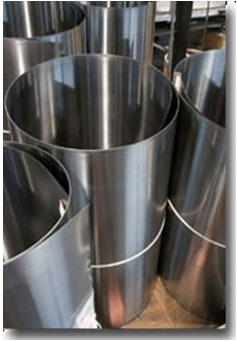Classification

Titanium and Titanium Alloys Used As Biomedical Materials
Submitted by admin on 02/21/2014
Having the following four properties, titanium and titanium alloys can be used as biomedical materials:
The biomechanical compatibility: mainly include hardness, yield strength, modulus of elasticity and ductility.
Implants break and become invalid, because of intensity being not high or mechanical properties between implants and human body bones mismatching, this is biomechanical incompatibility. Generally, the expected modulus of elasticity of bone repairing implants is close to that of human body bones. The modulus of elasticity of human body bone ranges from 4 GPa to 30 GPa.
The biocompatibility: implant materials should be non-toxic to human body. Implant materials would not cause any inflammation and allergic reaction in the body. Whether implants can be successfully implanted into the body depends on the reactions between materials and the human body. This also can judge the biocompatibility of materials.
The corrosion resistance and wear-resisting property: in body fluid environment, the effective service time of implants materials depend on wear-resisting property. If the wear-resisting property of implants is bad, implants would become flexible and generate wear debris, which would cause reaction in tissues.
The bone bonding ability: if the surface of implant materials can not well combine with human body bone and other tissues owing to micro motion, the implants would become flexible in the human body. The chemical surface roughness of implants plays the leading role to synostosis.
Titanium supplier-Zhengzhou Sanhui Co., Ltd can supply standard or customized titanium products, like titanium castings, titanium flanges, etc..

The biomechanical compatibility: mainly include hardness, yield strength, modulus of elasticity and ductility.
Implants break and become invalid, because of intensity being not high or mechanical properties between implants and human body bones mismatching, this is biomechanical incompatibility. Generally, the expected modulus of elasticity of bone repairing implants is close to that of human body bones. The modulus of elasticity of human body bone ranges from 4 GPa to 30 GPa.
The biocompatibility: implant materials should be non-toxic to human body. Implant materials would not cause any inflammation and allergic reaction in the body. Whether implants can be successfully implanted into the body depends on the reactions between materials and the human body. This also can judge the biocompatibility of materials.
The corrosion resistance and wear-resisting property: in body fluid environment, the effective service time of implants materials depend on wear-resisting property. If the wear-resisting property of implants is bad, implants would become flexible and generate wear debris, which would cause reaction in tissues.
The bone bonding ability: if the surface of implant materials can not well combine with human body bone and other tissues owing to micro motion, the implants would become flexible in the human body. The chemical surface roughness of implants plays the leading role to synostosis.
Titanium supplier-Zhengzhou Sanhui Co., Ltd can supply standard or customized titanium products, like titanium castings, titanium flanges, etc..

------分隔线----------------------------




